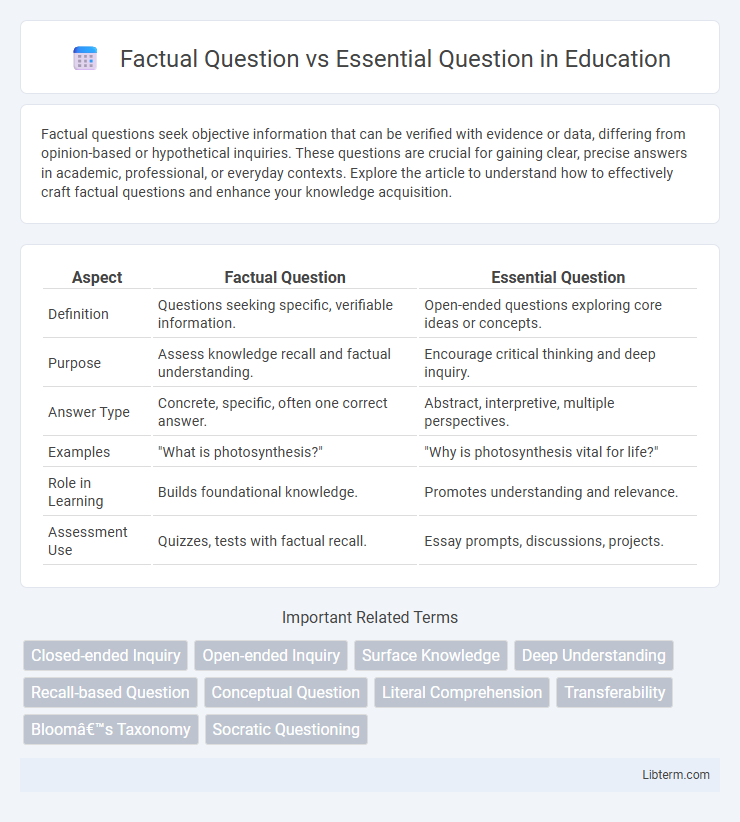Factual questions seek objective information that can be verified with evidence or data, differing from opinion-based or hypothetical inquiries. These questions are crucial for gaining clear, precise answers in academic, professional, or everyday contexts. Explore the article to understand how to effectively craft factual questions and enhance your knowledge acquisition.
Table of Comparison
| Aspect | Factual Question | Essential Question |
|---|---|---|
| Definition | Questions seeking specific, verifiable information. | Open-ended questions exploring core ideas or concepts. |
| Purpose | Assess knowledge recall and factual understanding. | Encourage critical thinking and deep inquiry. |
| Answer Type | Concrete, specific, often one correct answer. | Abstract, interpretive, multiple perspectives. |
| Examples | "What is photosynthesis?" | "Why is photosynthesis vital for life?" |
| Role in Learning | Builds foundational knowledge. | Promotes understanding and relevance. |
| Assessment Use | Quizzes, tests with factual recall. | Essay prompts, discussions, projects. |
Understanding Factual Questions
Factual questions target specific, verifiable information such as dates, names, or definitions, emphasizing recall and recognition of concrete details. These questions typically have one correct answer and are foundational for building knowledge in any subject area. Mastering factual questions supports comprehension and provides the necessary groundwork for tackling more complex analytical or essential questions.
Defining Essential Questions
Essential questions are open-ended inquiries that stimulate critical thinking and guide deep exploration of core concepts within a subject, unlike factual questions that seek straightforward, specific information. They encourage analysis, synthesis, and evaluation, often addressing the "why" and "how" behind a topic rather than just the "what." Defining essential questions involves identifying broad, thought-provoking prompts that foster ongoing investigation and meaningful understanding.
Key Differences Between Factual and Essential Questions
Factual questions seek specific, verifiable information with clear, objective answers often found in textbooks or databases. Essential questions are open-ended, promoting critical thinking and exploration of broader themes or concepts without definitive answers. The key difference lies in factual questions addressing concrete data, while essential questions encourage deeper understanding and inquiry.
Characteristics of Factual Questions
Factual questions are characterized by their requirement for specific, verifiable information, often answered with concrete data or straightforward facts. They focus on details such as dates, names, events, and definitions, enabling clear and definitive responses. These questions are essential for establishing foundational knowledge before exploring deeper, open-ended essential questions.
Characteristics of Essential Questions
Essential questions provoke deep inquiry, encouraging critical thinking and exploration beyond surface-level facts. They are open-ended, debatable, and designed to stimulate ongoing discussion rather than elicit single correct answers. Unlike factual questions, essential questions connect concepts to larger themes and real-world applications, fostering meaningful understanding and transfer of knowledge.
Examples of Factual vs Essential Questions
Factual questions involve specific information that can be verified, such as "What year did the American Civil War begin?" or "Who wrote 'To Kill a Mockingbird'?" Essential questions provoke deeper thinking and exploration, examples include "Why do societies engage in conflict?" or "How does literature influence cultural identity?" These distinctions guide learners from memorizing facts to developing critical understanding.
The Role of Factual Questions in Learning
Factual questions provide concrete information that forms the foundation for understanding complex concepts, enabling students to recall key details and support evidence-based reasoning. They play a crucial role in establishing baseline knowledge necessary for deeper inquiry and critical thinking. By reinforcing memorization and comprehension, factual questions prepare learners to engage more effectively with essential questions that challenge analysis and synthesis skills.
The Impact of Essential Questions on Critical Thinking
Essential questions drive deeper inquiry by encouraging analysis, evaluation, and synthesis of information rather than recalling simple facts. Unlike factual questions, which elicit specific, concrete answers, essential questions stimulate critical thinking by promoting exploration of underlying concepts and multiple perspectives. This approach enhances problem-solving skills and fosters a more comprehensive understanding of complex issues.
When to Use Factual and Essential Questions
Factual questions are best used when seeking specific, verifiable information such as dates, definitions, or concrete details, making them ideal for quizzes, data gathering, and foundational learning. Essential questions are more suitable for driving inquiry, critical thinking, and deep understanding, often guiding discussions on broader concepts, implications, and multiple perspectives. Use factual questions to establish baseline knowledge and essential questions to explore complex issues and foster analytical skills.
Enhancing Inquiry-Based Learning with Both Question Types
Factual questions provide specific, verifiable information that supports foundational knowledge, while essential questions stimulate critical thinking by encouraging exploration of broader concepts and underlying principles. Integrating both question types in inquiry-based learning fosters deeper engagement, promoting a balance between knowledge acquisition and conceptual understanding. Educators enhance cognitive skills by designing lessons that leverage factual questions to build context and essential questions to inspire analysis and reflection.
Factual Question Infographic

 libterm.com
libterm.com